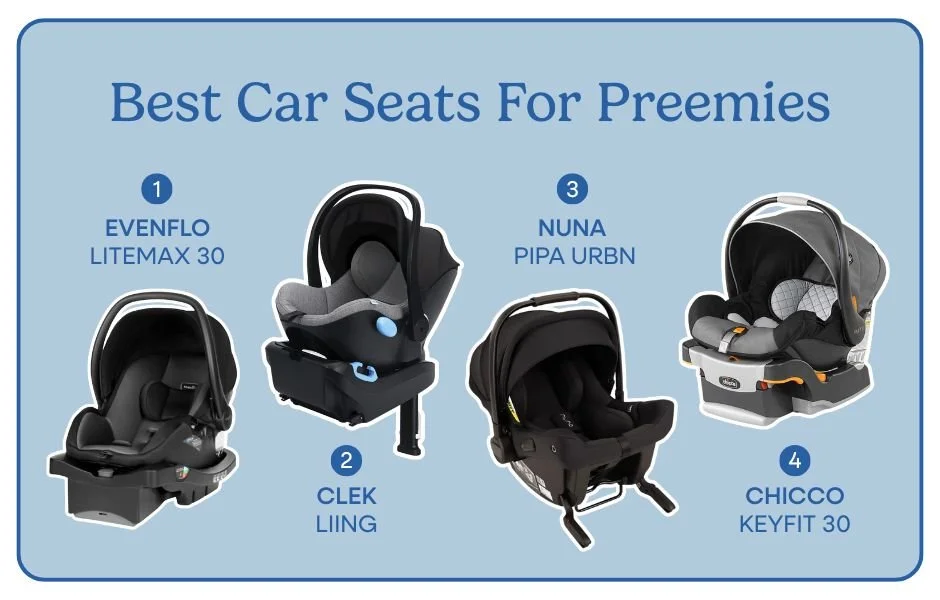The Best Car Seats for Preemies
Most parents don’t plan to have a preemie—but if you do, you quickly realize just how tiny those early days really are. While most infant car seats are rated from 4-5+ pounds, that doesn’t necessarily mean they will provide the best fit. Some seats are simply better suited for small babies, especially in those first few weeks. From extra support to a more secure fit, the right seat can make things a little easier when you’re already navigating so much! Congratulations on your newest addition, by the way!
If you’re new here, welcome! I’m Kelly, The Car Mom. I’m a mom of four, a certified Child Passenger Safety Technician (CPST), and I help families find the best cars and car seats to fit their needs. I’ve personally tested and reviewed dozens of seats, and I want to help you make the best choice—especially when you’re caring for a baby who needs a little extra support in those early weeks.
In this guide, we’ll walk through:
What makes a car seat preemie-friendly
The best car seats for preemies
What to do if you already bought a different seat
Quick question – are you having twins? I’ve got another great post for you right here!
What Makes a Car Seat Good for a Preemie?
When you're choosing a seat for a premature or low birth weight baby, there are a few things that we’re looking for.
Low weight minimum
Some infant seats start at 4 lbs, but not all actually fit a 4 lb baby safely. The seat should support babies as small as 3–4 lbs and have insert cushions that properly position the baby's body, head, and airway.
Short minimum harness height
Preemies are typically shorter than full-term babies. A good preemie seat has lower harness slots and/or inserts that boost baby up so the straps can fit below the shoulders, not above them.
Rethread harness
While no-rethread harnesses are convenient, they often have extra padding or bulk behind the baby’s head, which can push the head forward contributing to a chin-to-chest position.
Some no-rethread harness seats achieve good positioning better than others, but generally speaking a rethread harness is the way to go if you’re expecting a preemie!
Supportive, removable infant inserts
Some seats come with infant padding that’s optional or removable—ideal for customizing the fit as the baby grows. For a preemie, the insert should offer support without pushing the chin forward or compressing the airway.
The Best Car Seats for Preemies List
Here are my top picks for infant seats that are truly preemie-friendly, based on real-world experience, safety testing, and how well they fit the smallest passengers.
Evenflo LiteMax 30
Weight/Height Minimums: 3 lbs (with physician approval), 4lb, Evenflo lists a 17” minimum (news to me!)
Why it’s great: This seat is hands-down the best of the best when it comes to preemie fit. It’s been physician-approved for use with babies as small as 3 lbs and is often the top recommendation from CPSTs. It has a low harness height and a rethread harness that keeps things simple and streamlined. Oftentimes, the insert is removed, and not every version has inserts, I don’t believe. There’s a lot of varieties of this seat from Evenflo. I’d just omit the insert part. It’s a great seat without them.
Keep in mind: It’s one of the longest seats front-to-back and requires 1.5 inches of clearance from the front seat, so it may not work in smaller cars.
Clek Liing
Weight/Height Minimums: 4 lbs
Why it’s great: If you want a compact luxury seat that still fits preemies well, the Clek Liing is a fantastic option. This seat offers a rigid latch, a load leg, and European belt path routine if you want to install it baseless.
Nuna PIPA Urbn
Weight/Height Minimums: 4 lbs
Why it’s great: Another compact, premium choice that fits small babies surprisingly well. The Urbn is baseless by design and super lightweight—great for city living or smaller cars and third row access.
Chicco KeyFit 30
Weight/Height Minimums: 4 lbs
Why it’s great: The KeyFit 30 is one of the most popular infant seats on the market, and for good reason. It’s well-priced, easy to install, and has an excellent fit for small newborns. While it technically starts at 4 lbs and 19”, it’s known to accommodate smaller babies well in real-world use.
What Happens If You Already Bought a Different Seat?
Don’t panic. If you’ve already chosen a seat and your baby comes early, there’s a good chance they will fit just fine. It may or may not need some extra adjustments. But what if you’re not able to get a good fit? First, you can ask if your NICU/hospital has a CPST on staff. Some CPSTs work directly for the hospital and have tons of experience fitting the tiniest of passengers to their car seats. If the CPST (or you!) are still unable to get a safe fit, you can consider using another infant car seat – even if only for a few weeks.
Let’s Make Car Seat Shopping Easy
If you're navigating life with a preemie, you’ve got enough on your plate. Choosing a car seat shouldn’t be one more stressful thing to manage. The seats listed above are known for their reliable preemie fits and also comfortable for the weeks and months to come.
All of these seats can be great options for as long as your baby needs an infant seat—not just in the early days. They’re designed to offer a secure, comfortable fit for smaller babies, but they’ll also grow with them! And if you’re not sure how a particular seat will fit in your family car, I’ve got plenty of reviews and videos to help walk you through that step, too.
Do you have more questions about preemie car seats? Drop them in the comments! And for more safety tips, check out my latest posts:

